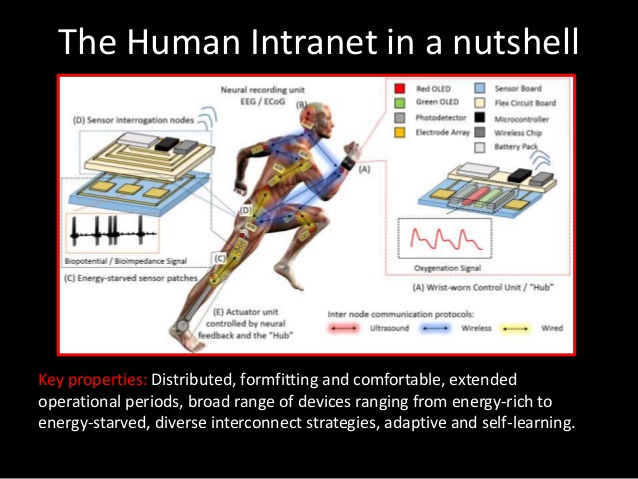humanintranet
With the explosive growth of the ”smart” society, enormous amounts of information are instantaneously available in the enhanced world around us, or the cyberworld beyond. Hence one may wonder if the traditional human input/output modalities have the necessary bandwidth or expressiveness to effectively deal with the increasing pace of an “augmented world”. The questions we are trying to address as part of this two-year Semiconductor Research Corporation (SRC) STARnet funded project is if and how advances in semiconductor and information processing technologies may help to alter this unbalance?
A first-generation Human Intranet intended to boost human input-output performance will be developed as an open, scalable, form fitting platform. It will seamlessly integrate an ever-increasing number of sensor, actuation, computation, storage, communication and energy nodes located on, in, or around the human body acting in symbiosis with the functions provided by the body itself. It will include a communication backbone, a heterogeneous power and data network, consisting of wired and wireless links.
Given the limited two-year span, we plan to focus on just a couple of use cases. One would focus on hybrid sensory expansion, while another would enable higher information output throughput through low-SNR actuation devices (such as pressure sensitive on-skin keyboards). Prototype systems will be built using existing as well as emerging devices. These prototypes will be used to evaluate the effectiveness of the techniques in terms of measurable parameters such as throughout increase, sensitivity enhancement, scope extension and learning complexity. Designed to work within an environment where devices connect to each other and collaborate to fulfill goals, the prototype systems will be built using existing as well as emerging devices.
Possible applications include less invasive medical diagnostic, monitoring, and treatment options; improved treatment outcomes; innovation; and improved communication.
Task or Theme Leaders: Jan Rabaey, Ana Arias, Pieter Abbeel, Jose Carmena, Bjoern Hartmann, Michel Maharbiz
Mailing lists and discussion forums may be found under the humanintranet link to the left.



